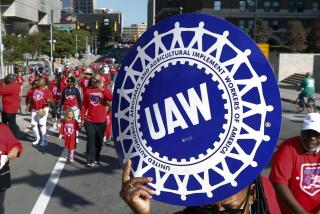Toyota Touts U.S. Investment
- Share via
CINCINNATI — For years the saying went, what’s good for General Motors Corp. is good for America.
Japanese automaker Toyota Motor Corp. has a new promotional campaign that says it is good for America too.
Billboards along highways in areas of the country such as the Cincinnati-northern Kentucky region, where Toyota employs about 8,800 people, tout the U.S. economic contributions of the company, which is on its way to passing GM as the world’s largest automaker.
The messages highlight numbers, such as 13 (“Donuts in a baker’s dozen; Toyota’s U.S. investment, in billions”) and 386,000 (“Kilometers to the moon; U.S. jobs created by Toyota”).
The billboards are in two dozen U.S. markets where Toyota has factories or supplier operations including Fremont, Calif., where Toyota teams with GM at an auto plant, and Huntsville, Ala., where Toyota makes engines.
“Our intent is to raise awareness of our growing U.S. presence,” said Patricia Pineda, group vice president for corporate communications at Toyota Motor North America Inc. “Our research tells us that consumers want to learn more about Toyota’s U.S. presence.”
She said Toyota highlighted its U.S. investments and “level of commitment” to the country in a campaign that began last month and includes local radio spots and airport advertising.
Toyota has led the way for Asian automakers that have steadily increased U.S. sales, and it now has about 13% of U.S. vehicle sales. While GM and Ford Motor Co. are facing plant closures and job cuts, Toyota wants to expand car production in the United States, such as recently announced plans to make as many as 100,000 Camrys a year at a Subaru plant in Lafayette, Ind.
Toyota’s message is generally warmly received in Kentucky, where it has provided a major economic boost and employs 7,000 workers at its Georgetown plant alone.
“I think most people, particularly in this area, like Toyota a lot,” said Kenneth Troske, who heads the University of Kentucky’s Center for Business and Economic Research. “They bring a lot of things to the community.”
But the billboards can be irritating to U.S. workers with an uncertain future.
“We’re not real happy about it,” said Tony Currington, vice president of United Auto Workers Local 696, with members facing possible closure of a Dayton, Ohio, brake plant by Delphi Corp., the largest auto parts supplier for former parent GM.
“As a result of us losing market share to the foreign imports, we’re losing American jobs,” Currington said, adding that the UAW has been weakened by Toyota’s mostly nonunion operations. “It just hurts our economy here.”
“It’s not the Japanese who are causing the market share decline,” said Bruce Belzowski, an auto analyst at the University of Michigan’s Transportation Research Institute. “It’s Americans buying the Japanese vehicles.”
He said Toyota’s latest campaign underlined that “they build where they sell.”
General Motors spokeswoman Ryndee Carney said the company usually didn’t comment on rivals’ ads. She noted that the company had launched its own new advertising this month that describes GM’s restructuring, price cuts and new products.
The ads’ tag line: “At the global car company that’s proud to be American.”
In an April 12 speech in New York, GM Vice Chairman Robert Lutz cited statistics about GM, Ford and DaimlerChrysler’s importance to the U.S. auto industry and economy, saying they account for 4% of U.S. gross domestic product and 11% of manufacturing shipments.
“People who think it doesn’t matter who owns our auto industry are flat wrong,” Lutz said.
But the days of Japan bashing and “Buy American” appeals have mostly faded, said Gordon Wangers, chief executive of Los Angeles-based Automotive Marketing Consultants Inc., which has done work for Toyota, GM and other companies.
“I think today’s consumers, especially in our global economy, are not particularly moved by it the way they once were. I think they’re moved by a good product at a good price,” he said.
He suggested that most young Americans, asked about their favorite car companies, would mention Toyota. He said Toyota had had a long-term strategy of being accepted as an American company, hitting another milestone in assimilation this year with the announcement that a NASCAR edition of Camry would begin racing next year in the Nextel Cup series.
“Those billboards are the culmination of 35 years of focus on being American in America,” Wangers said. “They’ve waited until now to thump their chest.”






